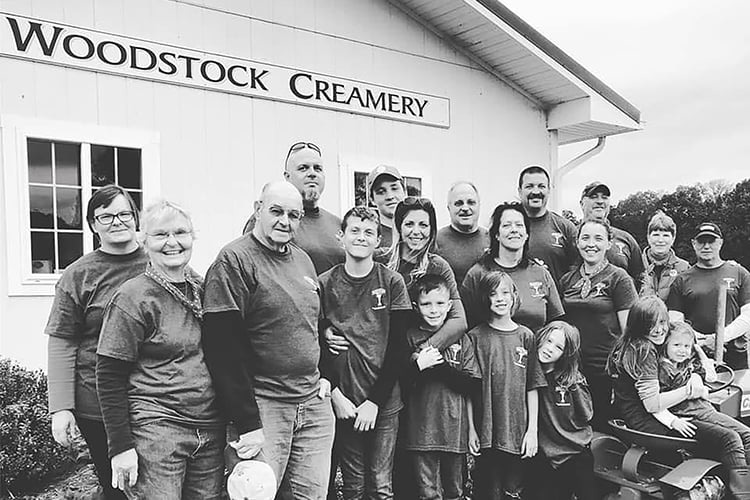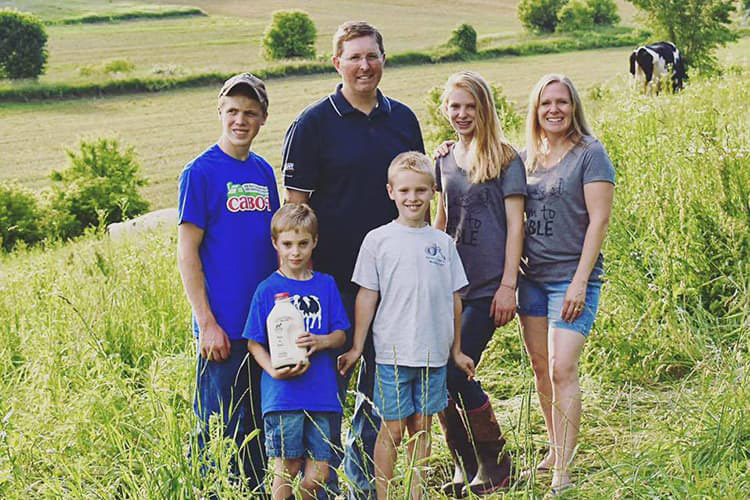The coronavirus pandemic has changed lives across the world. Farmers and ranchers have served through it all, with many directly marketing goods to meet increased demand and others providing product to businesses that have lost access to critical supply channels. While caring for their crops or livestock, along with their own families, they’re making sure their communities have access to essential resources during these uncertain times.
We’ve spoken with two farm families in Woodstock, Connecticut, about life during the coronavirus pandemic. Their stories mirror those of many farmers and ranchers and their heroic efforts to feed America. As farmers support our nation, USDA is here with resources to support our farmers.
Meet Lucas and Angela Young
Woodstock Creamery Farm Store at Valleyside Farm is owned by Lucas and Angela Young, along with Lucas’ parents, Tim and Wendy Young. Founded in 1819, the farm has been a staple in the community for 11 generations. By mid-April of this year, business had grown by 100 percent compared with pre-pandemic rates. Today, the farm store provides milk, yogurt, beef, pork, and local goods to an unprecedented number of patrons. All the dairy products are made on-site at their creamery, which adds an extra challenge during these times.

The Youngs have taken an all-hands-on-deck approach to managing their farm while meeting demand.
“The animals don’t know anything is different,” says Angela. “They keep producing milk every day. And pandemic or no pandemic, farm chores still need to be done.”
The Youngs’ four children have done their part, with chores such as bottling milk, helping in the store, and attending virtual classes. “It was a balancing act to keep enough product available for our community all while helping our kids to stay on track with school,” Angela said.
The Young family is grateful to their customers during the pandemic, who they say are keeping both the farm and the store running. As they’ve made adjustments to meet increased demand – like leveraging the store’s drive-thru window – USDA staff have continued offering one-on-one program delivery and technical support, using technology and socially distanced on-site meetings to enable them to remain at the farm serving customers.
Meet Matt and Chrissy Peckham
At Elm Farm, owners Matt and Chrissy Peckham are glad they decided to diversify a few years ago by opening their own farm store. Farm to Table Market offers dairy products, eggs, beef, pork, and local goods from nearby farms. Elm Farm has been in the Peckham family for over a century, with Matt and Chrissy raising the seventh generation of dairy farmers.

At a time when people were hunkering down due to the virus, the Peckhams were doing quite the opposite. Their market was originally open to walk-in customers and featured a convenient walk-up ice cream window. They repurposed that window to become the lifeline of the store, a move that supports social distancing measures and lessens the need for in-market visitors. The Peckhams also developed a website and began taking online and phone orders.
Farm to Table Market has noticed a significant increase in business since April. Sales of whole milk jumped to more than 116 gallons each day – a substantial increase from pre-pandemic times. Beef began selling out in a matter of hours.
Matt and Chrissy say they are “farmers through and through” and have faced the challenges of the pandemic head on. Like the Youngs, they’ve used virtual and in-person meetings with local USDA Service Center staff to meet the deadlines of their Conservation Stewardship Program contract all the while adjusting their operation to best serve customers.
“We have a job to do – feed the community,” says Chrissy. “Everything else is so small.”
As these uncertain times continue, so too will our local farmers and ranchers.
USDA Supports Our Farmers
USDA continues to assist agricultural producers with disaster assistance, conservation, safety net, and farm loan programs and services such as conservation planning and acreage reporting while taking safety measures in response to COVID-19.
Visit farmers.gov/coronavirus to learn about current USDA flexibilities and programs for farmers and ranchers impacted by the coronavirus pandemic, including the Coronavirus Food Assistance Program 2.
Carolyn Miller is a Public Affairs Specialist with NRCS in Tolland, Connecticut. She can be reached at carolyn.miller@usda.gov.


